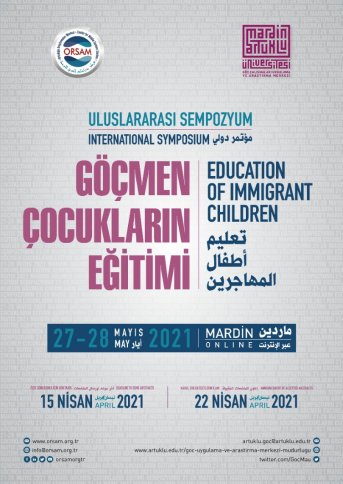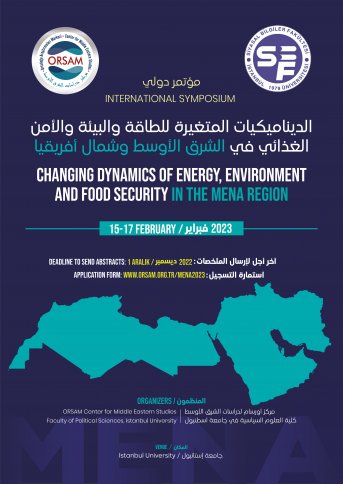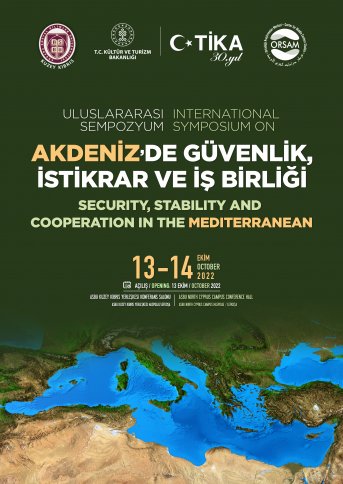
Symposium on Education of Immigrant Children
27-28 May 2021 / Mardin & Online
Due to civil wars and poverty, it is getting more and more difficult to live where you born and millions of emigrated people are struggling to survive under difficult conditions, either in refugee camps or by their own means in other countries they immigrated to. Almost all of the immigrants always keep the hope of return alive, but, it seems that the conditions in home countries and the efforts they spend at the places they immigrated, making a significant part of these migrations permanent. While discussing the problems such as the status of immigrants, new social environment and citizenship, unfortunately, the problem of immigrant children's education has always been ignored. However, education is vital in terms of the social cohesion and development of immigrants.
According to the United Nations’ data, 80 million people had to leave their homes as of 2019 worldwide and about 34 million of them are children under the age of 18. Solely, the situation in which Syrian immigrants in clearly shows us that the education of immigrant children has become to a problem that cannot be ignored or postponed. As of 2020, 2 million of more than 6.5 million Syrian refugees worldwide and 1 million 729 thousand of 3 million 643 thousand Syrians living in Turkey's are children in the compulsory education age. In the wake of the number of immigrants in Turkey to reach a very serious issue, primarily Turkey just tried to find an urgent solution to the educational problems of children in the camps with short-term policy. Later, within the scope of the legislation enacted in 2013 and 2014 and the Strategic Plan prepared, more permanent solutions were aimed.
As a result of the efforts on education of immigrant's children, in the 2019-2020 academic year, 684,919 of 1 million Syrian children at primary school age were included in the education system and schooling rate was at 63.29%. Despite these positive developments regarding the education of immigrants, problems regarding access to quality education remain. Not only for Syrians but all immigrants, for fair access to quality education and better management, there is a need for long-term strategies and policies covering improving school infrastructures and competence of administrators, social environment including cooperation with school-family-NGOs. Moreover, the education problem of immigrant children is not only related to Syrian children; this situation is also experienced by immigrant groups from other countries.
International "Education of Immigrant Children" Symposium organized by Mardin Artuklu University Center for Migration Studies and ORSAM (Center for Middle Eastern Studies), aims to discuss the problems and practices that we encounter in the education of immigrant children. Especially, education policies and legislation, access to education, local education administrations, practices in educational environments, suggestions for policy makers and implementers, and contributions to academic knowledge will be discussed. These studies will enable to make comparison on the situation of different immigrant groups in different countries.
Within the framework of the symposium, to discuss the role of NGOs in the education of immigrants and to share experiences of the teachers of immigrant students, a workshop will also be organized with the participation of academicians doing research in this field. Participants and researchers who will take part in the workshop are required to submit a summary. The abstracts to be presented to the symposium and workshop can be sent in Turkish, Arabic and English, provided that they are in the range of 500-750 words. After the referee evaluation, full texts presented in the symposium and workshop will be published in book to be compiled within the scope of the symposium.
Symposium Themes (Not limited with the followings):
In the context of immigrants and refugees:
- Education policies and legislation
- Access to education and local education policies
- Practices in educational environment
- Personality and identity development of immigrant children
- Participation of immigrant families in education
- The quality of the education
- Language barrier and language education
- Attitudes towards immigrant students
- Psycho-social support services
- Immigrant students in the Covid-19 pandemic
- Teacher’s competence
- Syrian teachers
- Best practices in the education of immigrant children
- Education programs and curriculum
- Monitoring and evaluation
- Orientation studies
- NGO Experiences
Terms of Participation:
The symposium welcomes all scholars and experts from social and human sciences. Regional experts, scholars, think tanks, research centers, media, decision-makers, and Ph.D. students can participate in related presentations and articles, provided they fulfill the points below:
- The writing language can be in English, Turkish, and Arabic.
- Presentations will be in Turkish, English, and Arabic.
- Texts will not exceed 7000 words.
- The abstract must be between 500-750 words; it should contain keywords and should be sent as a word file attached to the registration form to participate in the symposium.
- For Arabic abstracts, English translation of the abstract is also required in the same sent word file.
- In Arabic writing, headliner should be 16 font, sub-headlines 14 font, and the main text 12 font.
- The endnote system should be used.
- Articles must adhere to academic standards and should be original.
- You can fill out the registration form and send abstracts via Google form on the link below: https://forms.gle/ayAmuSZTUqqmd9Ph7
- For inquiries and correspondence, please contact: artuklu.goc@artuklu.edu.tr
Deadline for the Abstracts: 15 April 2021
Announcement of the Accepted Abstracts: 22 April 2021
Sessions: 27-28 May 2021
REGULATORY BOARD
- Honorary President: Prof. Dr. İbrahim Özcoşar, MAU Rector
- Chairman: Prof. Dr. Ahmet Uysal, ORSAM
- Chairman: Assoc. Prof. Dr. Sıtkı Karadeniz, MAU Migration Studies Application and Research Center
- Coordinator: Nazmi Çiçek, MAU Migration Studies Application and Research Center
- Coordinator: Oytun Orhan, ORSAM Levant Studies Coordinator
- Dr. Islam Altun, MAU Migration Studies Application and Research Center
- Dr. Muhammed Öz, MAU Faculty of Letters, Department of Educational Sciences
- Dr. Kamuran Gökdağ, MAU Faculty of Letters, Department of Philosophy
- Dr. Emin Selçuk Taşar, MAU Faculty of Architecture, Department of Architecture
- Dr. Seher Bulut, ORSAM, Syrian Studies Expert
- Dr. Samir Alabdullah, ORSAM, Syrian Studies Expert
- Research Associate Burak Ağalday, MAU Faculty of Economic and Administrative Sciences, Department of Political Science and International Relations
- Research Associate M. İhsan Özdemir, MAU Faculty of Economic and Administrative Sciences, Department of Political Science and International Relations
- Rıdvan Öner, PhD Student, MAU Department of Sociology
- Mihriban İlbaş, Postgraduate, MAU Sociology Department
Advisory Board
- Prof.Dr. Fatima Rumat, Muhammed V University, Rabat, Morocco
- Prof. Dr. Abdurrahman Ekinci, Mardin Artuklu University, Turkey
- Prof. Dr. Akif Kireçci, Social Sciences University, Turkey
- Prof. Dr. Birol Akgun, Yildirim Beyazit University, Ankara, Turkey
- Prof. Dr. Cengiz Tomar, Marmara University / Ahmet Yesevi University
- Prof. Dr. Eyup Artvinli, Eskişehir Osmangazi University, Turkey
- Prof. Dr. Faouzi Bendridi, Souk Ahras University, Algeria
- Prof. Dr. Fuat Erdal, Ibn Khaldun University, Turkey
- Prof. Dr. Fuat Güllüpınar, Anadolu University, Turkey
- Prof. Dr. İsmail Kira, Skikda University, Algeria
- Prof. Dr. Kemal İnat, Sakarya University, Turkey
- Prof. Dr. M. Nesim Doru, Mardin Artuklu University, Turkey
- Prof. Dr. Murat Erdogan, Turkish-German University, Turkey
- Prof. Dr. Al Chikh Samir Ali, Mardin Artuklu University, Turkey
- Prof. Dr. Seif el-Islam Chouia, Badji Mokhtar University, Algeria
- Prof. Dr. Yilmaz Colak, Police Academy, Turkey
- Prof. Dr. Yusuf Adıgüzel, Istanbul University, Turkey
- Prof. Dr. Yusuf El-Kasımi, Guelma University, Algeria
- Prof. Dr. Yusuf Tekin, University of Haci Bayram, Turkey
- Prof. Dr. Zülküf Kara, Mardin Artuklu University, Turkey
Science Board
- Assoc. Prof. Dr. Faysal Özdaş, Mardin Artuklu University, Turkey
- Assoc. Prof. Dr. Halis Sakız, Mardin Artuklu University, Turkey
- Assoc. Prof. Dr. Hasan Duran, Istanbul University, Turkey
- Assoc. Prof. Dr. Hıdır Apak, Mardin Artuklu University, Turkey
- Assoc. Prof. Dr. Izzet Çıvgın, Mardin Artuklu University, Turkey
- Assoc. Prof. Dr. Khadija Hassan Jasim, Ministry of Education, Iraq
- Assoc. Prof. Dr. Mahmut Kaya, Harran University, Turkey
- Dr. Abbas Boughalim, Muhammed I University, Morocco
- Dr. Ahmet Gokcen, Muş Alparslan University, Turkey
- Dr. Caner Yelbaşı, Mardin Artuklu University, Turkey
- Dr. Deniz Işıker Bedir, Mardin Artuklu University, Turkey
- Assoc. Prof. Dr. Muhammad Abdalmecid, IRAM, Turkey
- Dr. Hakan Gülerce, Harran University, Turkey
- Dr. Naif Ergün, Mardin Artuklu University, Turkey
- Dr. Omar Faruk Günenç, Mardin Artuklu University, Turkey
- Dr. Samir Trabelsi, Wrock University, Canada
- Dr. Fateh Shaban, Academic Center for Development and Peace Studies ACDP
- Dr. Rami Alkhalafalabdulla, Izmir Katip Çelebi University, Turkey
- Dr. Ahmed Halil, Selcuk University, Turkey
- Dr. Adnan Rashid Mamo, Free Aleppo University, researcher at CARA
- Assoc. Prof. Dr. Mohamed Alfares, Mardin Artuklu University, Turkey
- Assoc. Prof. Dr. Mohamad Rashid, Mardin Artuklu University, Turkey





